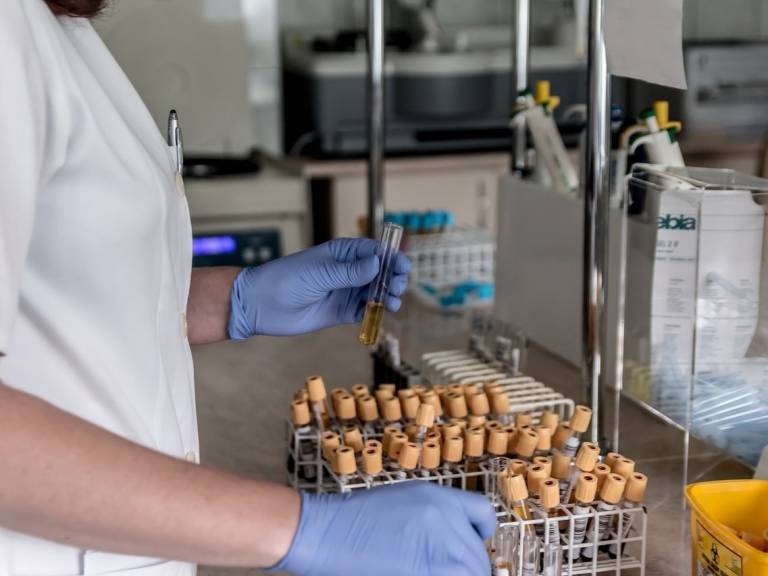Urine test could help monitor bladder cancer treatment
26 September 2018
Researchers at UCL Cancer Institute have shown for the first time that immune cells found within the urine mirror those found in cancerous bladder tumours.

This discovery could potentially help doctors to track patient responses to bladder cancer treatment in the future, in a quick and easy way with a urine test.
In the study, published in the Journal of Experimental Medicine, researchers at the UCL Cancer Institute and University College London Hospitals (UCLH) have shown for the first time that immune cells in the urine of bladder cancer patients accurately reflect those in the tumour environment.
Unexpectedly, the Cancer Research UK funded study, showed that immune cells found in the urine were more representative of the tumour than immune cells from the blood, suggesting that urine, rather than blood liquid biopsies, could help to more accurately monitor response to immunotherapy in patients.
Immunotherapy has shown success in patients with advanced bladder cancer and is approved in the UK for certain patients. Despite this, only around a quarter of patients respond to immune checkpoint-targeting drugs, demonstrating a pressing need to better understand the immune landscape of bladder cancer and develop new therapeutics.
The study, which was also supported by the National Institute for Health Research, looked at 32 patients with bladder cancer that had invaded the muscle wall. Urine and blood samples were taken on the day of surgery to remove their tumour, and these were compared with both their tumour and healthy bladder tissue.
The researchers at UCL Cancer Institute and UCLH were able to identify T cells in the urine, which are usually absent in healthy individuals. Crucially, the T cells matched those found within the tumour environment of the bladder cancer, regardless of cancer stage and treatment history.
Co-lead author, Dr Sophia Wong (UCL Cancer Institute), said: "Our results show for the first time that urine liquid biopsies can be used as a non-invasive window into the bladder tumour environment.
"This valuable information could be used to discover immunotherapy targets and aid the design of combination treatments that exploit different components of the immune system.
"This research looked at a single time point, so clinical trials that include urine analysis over time are now needed to find out whether urine-derived T cells could tell us if a patient is responding to treatment, or be an early warning that a switch in therapy is required."
The study also identified a relationship between urine-derived T cells and patients' chance of survival, as the disease was more likely to return in people with higher numbers of these cells. This indicates that urine-derived T cells may therefore also serve as a prognostic marker.
There are around 10,300 people in the UK diagnosed with bladder cancer every year. And it can be difficult to treat; just more than half (53%) of patients survive their disease for 5 years or more.
The paper's two senior authors were Professor Sergio Quezada, who leads the Immune Regulation and Tumour Immunotherapy Lab at UCL Cancer Institute and Dr Mark Linch, Consultant Oncologist at UCLH and Senior Lecturer at UCL Cancer Institute.
Dr Linch said: "This valuable information that can repeatedly be obtained without the need for invasive biopsies, could be an early warning that a switch in therapy is required and a signpost for which therapy might be most effective.
"These results demonstrate what can be achieved when the clinical and scientific teams work closely together along with the tremendous support from the patients and their families."
Professor Peter Johnson, an immunotherapy expert at the Cancer Research UK Southampton Centre, said: "Immunotherapy holds great promise for cancers that are difficult to treat, but a greater knowledge of the complex immune system is required to unlock their potential.
"By using a non-invasive urine test to profile the bladder cancer immune landscape, this small study could help us understand why only a fraction of patients respond to immunotherapy.
"If the findings are supported by larger studies, this early research suggests that urine liquid biopsies could one day help stratify patients for immunotherapy, identifying those most likely to benefit, while sparing unnecessary treatment in those who likely won't."
Links
- Study paper in the Journal of Experimental Medicine
- Dr Sophia Wong
- Professor Sergio Quezada
- Dr Mark Linch
- UCL Cancer Institute
- UCLH Urological Cancers
- Cancer Research UK
- NIHR
Image
Credit: Pixabay
Media contact
Henry Killworth
Tel: +44 207 679 5296
E: h.killworth [at] ucl.ac.uk
 Close
Close

